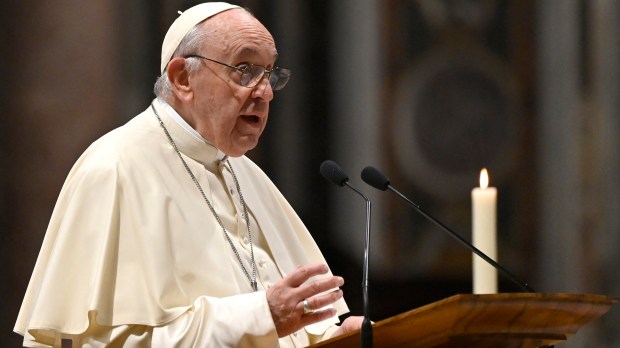On January 10 Pope Francis addressed the diplomats who represent the 183 nations with which the Vatican has diplomatic relations. The pope’s annual talk to the Vatican diplomats for Christmas and New Year greetings is usually complex and wide-ranging, and this year’s was as well.
One point dealt with was “cancel culture.”
The Holy Father looked at this trend in the context of what he called “the diminished effectiveness of many international organizations.”
“Not infrequently, the center of interest has shifted to matters that by their divisive nature do not strictly belong to the aims of the organization,” the pope observed.
As a result, agendas are increasingly dictated by a mindset that rejects the natural foundations of humanity and the cultural roots that constitute the identity of many peoples.
The pope said that he considers this way of working as “a form of ideological colonization, one that leaves no room for freedom of expression and is now taking the form of the ‘cancel culture’ invading many circles and public institutions.”
Under the guise of defending diversity, it ends up cancelling all sense of identity, with the risk of silencing positions that defend a respectful and balanced understanding of various sensibilities. A kind of dangerous “one-track thinking” [pensée unique] is taking shape, one constrained to deny history or, worse yet, to rewrite it in terms of present-day categories, whereas any historical situation must be interpreted in the light of a hermeneutics of that particular time, not that of today.
“Ideological colonization”
The phrase “ideological colonization” is one that the pope has used on a number of occasions. He often uses it in reference to family ethics, marriage, and gender issues. And it often comes up in regard to poorer regions of the globe, and the influence wielded by rich countries in financial support.
In 2015, in a meeting with families in the Philippines, he said:
Let us be on guard against colonization by new ideologies. There are forms of ideological colonization which are out to destroy the family. They are not born of dreams, of prayers, of closeness to God or the mission which God gave us; they come from without, and for that reason I am saying that they are forms of colonization. Let’s not lose the freedom of the mission which God has given us, the mission of the family. Just as our peoples, at a certain moment of their history, were mature enough to say “no” to all forms of political colonization, so too in our families we need to be very wise, very shrewd, very strong, in order to say “no” to all attempts at an ideological colonization of our families. We need to ask Saint Joseph, the friend of the angel, to send us the inspiration to know when we can say “yes” and when we have to say “no”. […] While all too many people live in dire poverty, others are caught up in materialism and lifestyles which are destructive of family life and the most basic demands of Christian morality. These are forms of ideological colonization. The family is also threatened by growing efforts on the part of some to redefine the very institution of marriage, by relativism, by the culture of the ephemeral, by a lack of openness to life.
That same year, to the bishops of Central African Republic, he said, “I cannot but encourage you to give marriage all the pastoral care and attention it deserves, and not to be discouraged in face of resistance caused by cultural traditions, human weakness or the new ideological colonization that is spreading everywhere.”
In 2016, meeting with bishops of Poland, he said:
In Europe, America, Latin America, Africa, and in some countries of Asia, there are genuine forms of ideological colonization taking place. And one of these – I will call it clearly by its name – is [the ideology of] “gender.” Today children – children! – are taught in school that everyone can choose his or her sex. Why are they teaching this? Because the books are provided by the persons and institutions that give you money. These forms of ideological colonization are also supported by influential countries. And this terrible!
In 2016, returning from Azerbaijan and Georgia, the pope was asked to speak about transgenderism. Giving the example of comments made by a 10-year-old boy, the Pope said, “It is one thing if a person has this tendency, this option; some people even change sex. But it is another thing to teach this in schools, in order to change people’s way of thinking. I call this ‘ideological colonization.'”
In 2017, on the feast of Our Lady of Guadalupe, he invited, “let us see the richness and cultural diversity of our peoples of Latin America and the Caribbean; it is a sign of the great richness that we are invited not only to cultivate, but also, especially in our time, to courageously defend from every attempt at homogenization which ends by imposing — with attractive slogans — a single way of thinking, of being, of feeling, of living; that ends by rendering pointless and barren what we inherited from our forebears; that results in making people — especially our young people — feel inadequate because they belong to this or that other culture. Ultimately, our fruitfulness demands that we protect our peoples from an ideological colonization that erases what is richest in them, be they indigenous, Afro-American, of mixed race, farmers, or residents of the periphery.
Returning from Panama in 2019, he spoke of sex education being affected by this colonization: “Objective sex education should be offered [in schools], as is, without ideological colonization. Because if sex education steeped in ideological colonization is taught in schools, it destroys the person.”
Don’t cancel, cherish
To the diplomats today, Pope Francis urged that diplomacy should be truly inclusive, “not canceling but cherishing the differences and sensibilities that have historically marked various peoples.”
“In this way, it will regain credibility and effectiveness in facing the challenges to come, which will require humanity to join together as one great family that, starting from different viewpoints, should prove capable of finding common solutions for the good of all,” he said.
He added that “certain enduring values” shouldn’t be overlooked.
“Here,” he said, “I wish to mention in particular the right to life, from conception to its natural end, and the right to religious freedom.”


